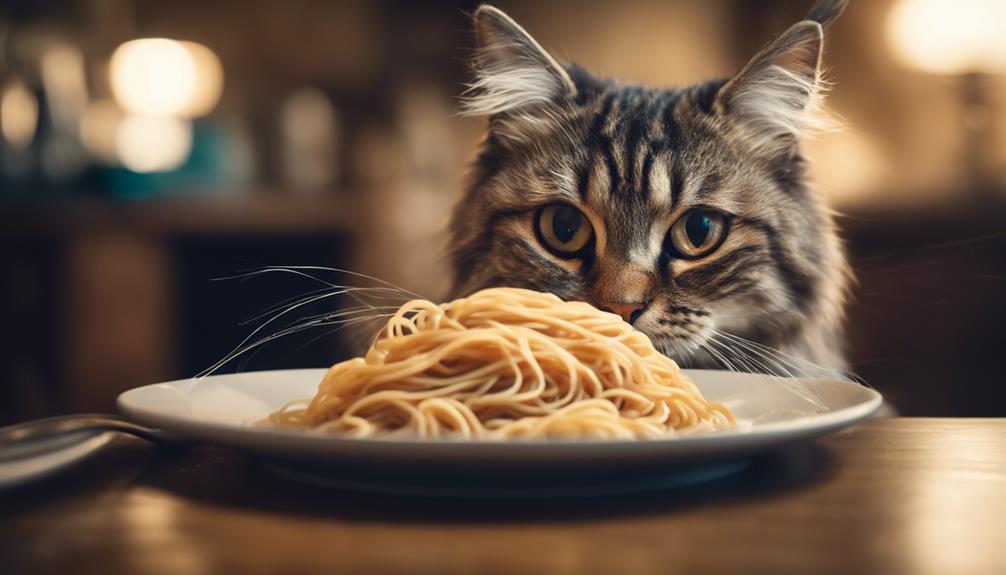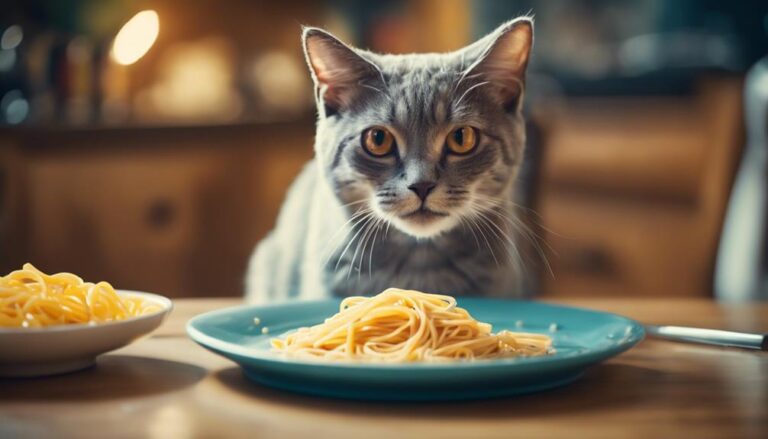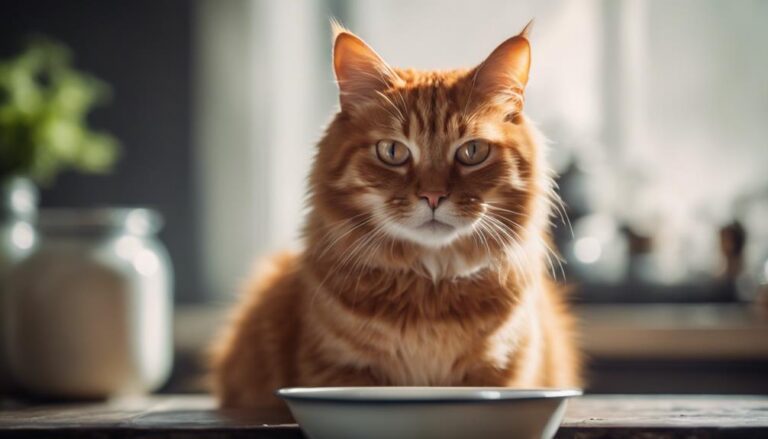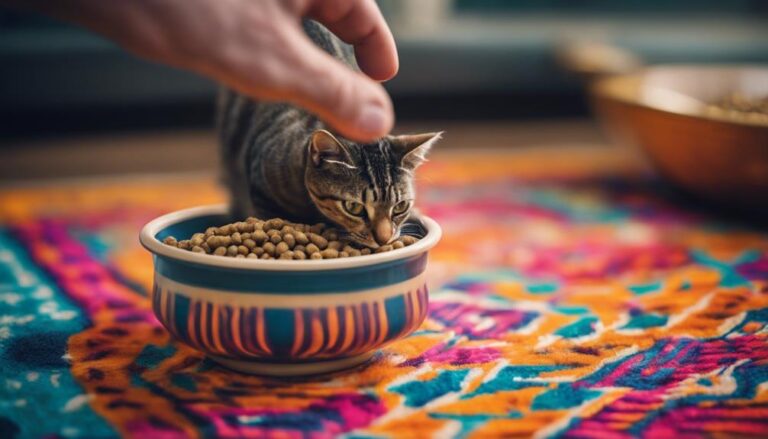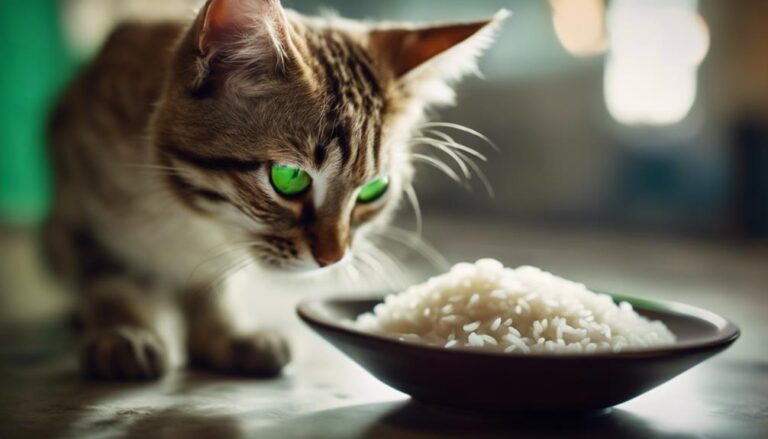You might have pondered about whether cats can enjoy a plate of spaghetti like their human companions. While it may seem like a harmless treat, the reality is a bit more intricate when it comes to feline dietary needs. Cats have specific nutritional requirements that spaghetti doesn't fully meet, raising concerns about their health and well-being. Before you decide to share your pasta dish with your feline friend, there are crucial factors to consider that might surprise you.
Potential Risks of Feeding Spaghetti to Cats
Feeding spaghetti to cats poses potential risks due to its high carbohydrate content and the presence of toxic ingredients in sauces. Cats have specific dietary requirements that differ from humans, and spaghetti may not align with those needs. The excessive consumption of spaghetti can lead to protein deficiency and obesity in cats, impacting their overall health.
Furthermore, spaghetti sauces often contain toxic ingredients like garlic and onions, which are harmful to cats when ingested. These ingredients can cause gastrointestinal issues, such as vomiting and diarrhea, and in severe cases, damage to their red blood cells.
When considering what food to offer your cat, it's crucial to avoid processed canned spaghetti that may include ingredients not safe for feline consumption. While cats may show interest in spaghetti, it's best to refrain from allowing them to habitually eat it to prevent potential health complications. Prioritizing a balanced and species-appropriate diet for your cat is essential for their well-being.
Nutritional Considerations for Cats and Spaghetti
Consider the nutritional implications of offering spaghetti to your feline companion. While Cats Eat Spaghetti might seem harmless, it lacks the essential nutrients that are vital for your cat's health. Spaghetti is high in carbohydrates, providing energy but not meeting the nutritional requirements of cats.
Feeding spaghetti to your cat is similar to giving sweets to children – enjoyable but not nutritious. Cats require a balanced diet with essential nutrients that are found in specialized cat food, not in human foods like spaghetti. Consuming large amounts of spaghetti can lead to nutrient deficiencies and potentially result in various health issues for your cat.
Therefore, it's crucial to prioritize your cat's health by providing them with the appropriate nutrition they need through their regular cat food, ensuring they receive all the essential nutrients required for their well-being.
Safe Ways to Offer Spaghetti to Cats
When offering spaghetti to your cat, remember to keep portions small and ensure the noodles are plain and fully cooled.
Consider any potential ingredients that could be harmful to your feline friend.
Portion Control Tips
To offer spaghetti to your cat safely, remember to provide small amounts of plain, cooked spaghetti as an occasional treat. Portion control is crucial to avoid upsetting your cat's diet. Start by offering a small portion and monitor how your cat reacts; adjust the serving size accordingly.
It's important to steer clear of adding sauces, herbs, or spices as they could be toxic to cats. Always ensure the spaghetti has cooled down before serving it to your feline friend. If you have any concerns about incorporating spaghetti into your cat's diet, consulting a vet is highly recommended for personalized advice.
Ingredient Considerations
You can safely offer plain, cooked spaghetti to your cat as an occasional treat, keeping portion sizes small and free of any added sauces, herbs, or spices. Cats can eat a small amount of plain, cooked spaghetti without any issues. However, cats should never be given spaghetti with sauces, herbs, or spices as these can upset their digestive systems.
Remember that cats are obligate carnivores, so while they can enjoy a small serving of plain spaghetti, it shouldn't replace their regular balanced diet. Cats can't handle raw spaghetti well, so always ensure it's cooked thoroughly before offering it to your feline friend. By following these ingredient considerations, you can treat your cat to a safe and enjoyable spaghetti experience.
Consulting a Veterinarian Before Feeding Spaghetti
Before offering spaghetti to your cat, consult your veterinarian first. They can assess potential health risks and determine if spaghetti is suitable for your cat's diet.
Seeking their approval is crucial for your cat's well-being.
Vet Approval Necessary
Curiously, have you consulted a veterinarian about feeding spaghetti to your cat? Here are some key reasons why vet approval is necessary before introducing spaghetti to your feline friend:
- Personalized Advice: Vets can tailor their recommendations based on your cat's unique health and dietary requirements.
- Portion Sizes: They can advise on the appropriate amount of spaghetti to feed your cat to prevent overeating or nutrient imbalances.
- Risks Associated: Vets can explain the potential risks of feeding spaghetti to cats, such as digestive issues or allergic reactions.
- Alternative Treats: They can suggest healthier treat options that are safer and more beneficial for your cat.
- Preventing Issues: Consulting a vet beforehand can help avoid any potential digestive upsets or health complications from introducing new foods.
Health Risks Considered
Seeking guidance from a veterinarian before introducing spaghetti to your cat is essential for evaluating potential health risks. While dogs eat spaghetti without issue, some ingredients like garlic and onions commonly found in spaghetti sauces can be toxic to cats.
Additionally, spaghetti offers empty calories that may lead to obesity and nutrient imbalances. Feeding your cat spaghetti regularly could result in protein deficiency and a lack of essential vitamins and minerals crucial for feline health. Consulting with your vet will help you determine if and how spaghetti can be safely incorporated into your cat's diet as an occasional treat, ensuring their well-being and preventing any adverse health effects.
Moderation and Frequency of Spaghetti Treats for Cats
For cats, it's essential to offer spaghetti treats in moderation to prevent potential health risks associated with imbalanced diets. While it may be tempting to let your cat eat human food like spaghetti, it's crucial to remember that moderation is key when incorporating it into your feline's diet. Here are some important points to consider:
- Limiting portion sizes: Only give your cat a little bit of spaghetti as an occasional treat to avoid nutrient deficiencies.
- Balancing nutrients: Since spaghetti is high in carbohydrates but lacks essential nutrients, it shouldn't be a significant part of your cat's diet.
- Avoiding overfeeding: Similar to how you wouldn't let a child indulge in sweets constantly, cats should only have spaghetti sparingly.
- Monitoring reactions: Keep an eye on your cat's response to spaghetti, as overconsumption can lead to refusal or digestive issues.
- Caution with treats: Approach offering spaghetti treats with caution to prevent any potential health risks related to imbalanced diets.
Alternatives to Spaghetti for Feline Diet
Consider incorporating zucchini noodles, plain cooked proteins like chicken or fish, or commercial cat treats as healthier alternatives to spaghetti in your feline's diet.
Zucchini noodles are a healthy option due to their low-carb content, providing a lighter alternative to traditional pasta.
Opting for plain, cooked proteins such as chicken or fish can offer more appropriate nutrients for your cat compared to spaghetti, ensuring they receive essential proteins for their diet.
Commercial cat treats or specially formulated cat foods are also better choices to meet your feline's dietary needs, as they're specifically designed to provide the necessary nutrients for cats.
Frequently Asked Questions
Can Cats Eat Tomato Sauce?
Yes, cats should avoid tomato sauce. It contains harmful elements like garlic, onion, and salt, which can be toxic to felines. Be cautious when feeding cats tomato-based products as they may cause serious side effects.
Is Cooked Pasta Good for Cats?
Cooked pasta is safe for cats in moderation. While it lacks vital nutrients, a small serving as an occasional treat is fine. Avoid tomato-based sauces as they can contain harmful ingredients. Remember, balance is key.
Can a Cat Eat Cheese?
You can give your cat small amounts of cheese as an occasional treat. Remember to watch for any digestive issues. Avoid cheese with harmful ingredients. Consult your vet to ensure it's suitable for your cat's health.
Can Cats Eat Spaghetti With Cheese?
You should be cautious when feeding your cat spaghetti with cheese. While small amounts of cheese can be safe, too much can cause digestive issues. Monitor for any adverse reactions and consider the high-fat content.

